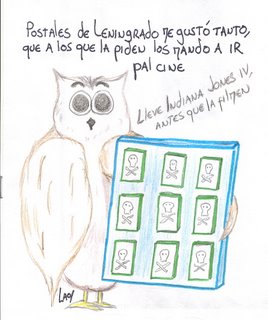A group of young Venezuelan filmmakers have succeeded in illustrating some of the country's history or adapting famous pieces of literature (both international and national) through films that have been well-received by the general public. Many Venezuelan movies in the past are considered extremely violent, and the emergence of these new kinds of films are showing new expressions of creativity.
Four main examples of films from 2008, with thoughts from bloggers are:
Postales de Leningrado (Postcards from Leningrad)
Since illegal and bootlegged copies of movies are extremely popular in Venezuela, El Buho Negro [es] [1]comments in this drawing (as if the owl were a bootlegger):

“I liked Postales de Leningrado so much that when anybody asks for it, I send them to the movies”
Miranda Regresa (Miranda Returns)
El Hijo de la Bohemia [es] [2] says:
Quisiera encontrar un defecto para no hablar de obra perfecta, pero me temo que tendré que verla unas cuantas veces más para lograrlo. La realización es soberbia, conmovedora, arruga el corazón en muchas ocasiones y nos hace amar más a Venezuela. La música (que incluye pinceladas de nuestro “Gloria al Bravo Pueblo”) sin lugar a dudas motiva a ello, pero lo mejor de todo es que … ¡se escucha! ¿Dónde ha estado este Director de Sonido todo este tiempo?
I would like to find a fault so that I wouldn't talk about a perfect film, but I’m afraid I’ll have to watch it several times to do so. The filmmaking is superb, moving, touches the heart on many occasions and makes us love our country even more. The music (that includes brushstrokes of our national anthem) no doubt helps, but the best thing is… we can hear it! Where has the Sound Director been all this time?
Cyrano Fernández
Cyrano Fernández, an adaptation of Cyrano de Bergerac [3] was not as well-received as the previously mentioned films, but it certainly raised interest among the bloggers:
Ysabel, in her blog Ventana Actual [es] [4]says:
Cyrano es también un héroe social; es un personaje que defiende la ética y la dignidad popular a toda costa, estrellándose una y otra vez contra la realidad de todos los días (…) actuaciones conmovedoras y plenas de realismo dan solidez a este filme que rompe esquemas dentro de nuestra cinematografía
Juan, in Hoy Critico [es] [5] makes severe comments from the technical point of view and adds some suggestions:
…me gustaria al menos solo una vez poder ver una pelicula donde el 80% de las palabras producidas no sean groserias y en las que no se trate siempre el tema del “malandreo”…
Boves, el Urogallo (Boves, the Capercaillie)
Boves, el urogallo is another historical drama and an adaptation of the historical novel written by Francisco Herrera Luque [6], and a film of which the audience and the critics have been waiting.
Blogacine [es] [7]an outstanding blog about Venezuelan films and filmmaking gives a very interesting argument on the literary piece and the character [8]:
Pocos personajes condensan mejor las contradicciones y la tragedia de nuestras guerras de independencia como José Tomás Boves.
No hay acaso mejor manera de entender nuestra independencia que examinarla desde el punto de vista del antihéroe, del antagonista paradigmático que encarna la figura de Boves. Puede que sólo a través de su mirada, Bolívar adquiera una verdadera dimensión humana, alejado del acartonamiento dramático y narrativo al que su figura histórica parece condenada irremediablemente
There are no better ways to understand our Independence than to examine it from the point of view of the anti-hero, the paradigmatic antagonist that incarnates the figure of Boves. It is possible that just under his view, Bolívar can acquire a real human dimension, far from the dramatic and stiff figure to which he seems to be irreparably condemned.
And a very interesting argument on the industry itself:
…por un lado, nuestra producción contemporánea de ficción parece poca y, acaso (no me atrevería a asegurarlo) de poco atractivo. No obstante, por otro lado, tenemos una de las industrias más poderosas del mundo en la generación de ficción: la telenovela.